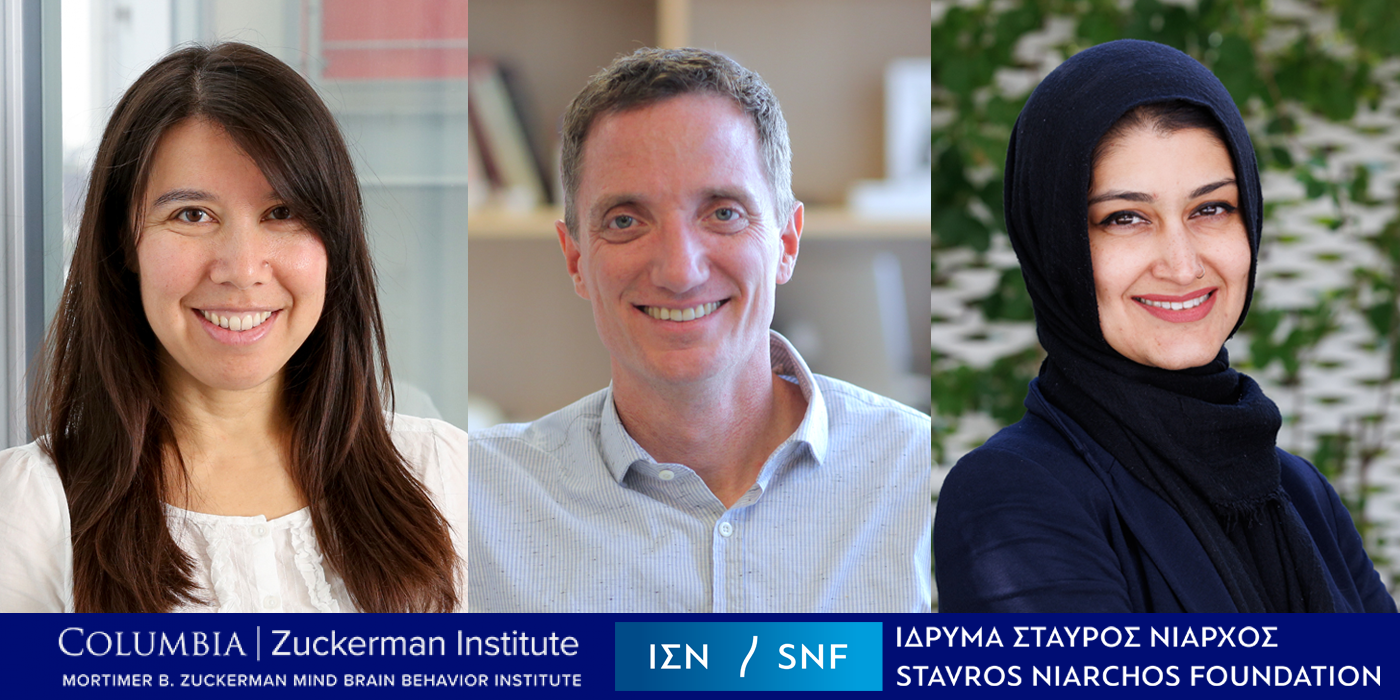Though it might feel automatic to suddenly reach and grab for a falling cup, a lot has to line up for this action to take place--even if you don’t manage to catch the cup in time. What does it take to choreograph the cells across the brain in just the right way to do what we need to do? In this event, three experts studying the neuroscience of movement will discuss how neurons work together to generate a wealth of behaviors, from a simple reflex to complex learned skills.
Gwyneth Card, PhD, Associate Professor of Neuroscience at Columbia's Zuckerman Institute and Investigator at the Howard Hughes Medical Institute, will open our event by highlighting her research on neurons, the building blocks of behavior. Animals have a seemingly infinite realm of options when it comes to movement, from walking to leaping, hovering to landing, and even simply remaining still. How do the brain’s cells orchestrate the right action at the right time, especially in a dynamic, ever-changing environment? Using the fruit fly as a model system, we can now start to answer these questions.
Mark Churchland, PhD, Associate Professor of Neuroscience at Columbia's Zuckerman Institute and Co-Director of the Grossman Center for the Statistics of Mind, will then guide us on an exploration of his work looking into how the brain prepares to act. By incorporating approaches from mathematics into neuroscience, his research sheds light on the ‘neural machinery’ that generates movement. A better understanding of that machinery aids the design of brain computer interfaces that have the goal of aiding paralyzed human patients.
Following the two talks, Sumaira Zamurrad, PhD, Associate Research Scientist at Columbia University’s Zuckerman Institute, will moderate a discussion and Q&A with the speakers. Audience questions are welcomed, either submitted during registration or live during the event.
About the experts
Gwyneth Card, PhD, is Associate Professor of Neuroscience at Columbia University's Zuckerman Institute and Investigator at the Howard Hughes Medical Institute. Her research aims to understand the neural mechanisms and circuit architectures that underlie behavior choice for ecologically relevant, visually-guided behaviors of the fly (Drosophila). Recent work has focused on using automated, high-throughput behavior tracking together with genetic tools and electrophysiology in behaving flies to study the neural circuits that govern simple decision behavior during Drosophila escape responses. Previously, Dr. Card was a Group Leader at the Howard Hughes Medical Institute Janelia Research Campus. She received her PhD with Dr. Michael Dickinson at Caltech, an MPhil with Dr. Simon Laughlin at the University of Cambridge, and a Bachelor’s degree from Harvard University.
Mark Churchland, PhD, is Associate Professor in the Department of Neuroscience at Columbia University Medical Center, and he is the co-director of the Grossman Center for the Statistics of Mind. He received his BA in mathematics and psychology from Reed College in Portland Oregon and his PhD in neuroscience from the University of California San Francisco. His postdoctoral work was in the Neural Prosthetic Systems Laboratory at Stanford University. Dr. Churchland’s research focuses on how the brain controls voluntary movement and addresses questions such as: how does the brain prepare and generate voluntary movement? What is the key event that triggers a movement, and in doing so turns thought into action? Can we reduce the problem of movement generation to a problem of characterizing the neural dynamics that are necessary to generate muscle activity? If so, how should we then think of upstream ‘cognitive’ processes that determine which movement to make and when to make it? Dr. Churchland is a recipient of the 2012 NIH Directors’ New Innovator Award. He received a 2015 Klingenstein-Simons Fellowship Award, a 2013 McKnight Scholar Award, a 2013 Sloan Research Fellowship, and a 2012 Searle Scholars Award. He was a 2006 recipient of the Burroughs Wellcome Fund Career Award and a 2003 recipient of the Helen Hay Whitney Research Fellowship.
Sumaira Zamurrad, PhD, is Associate Research Scientist in the lab of Dr. Richard S. Mann at the Columbia University’s Zuckerman Institute. Born and raised in Pakistan, she landed in the US and earned her Bachelors in Biochemistry at Stony Brook University followed by her PhD at the Albert Einstein college of medicine in the lab of Dr Julie Secombe. There, she studied intellectual disability mutations in a Drosophila (fruitfly) model organism. Currently, Dr. Zamurrad is investigating the intricate neural circuitry that is responsible for eliciting specific walking behaviors once again in her favorite model organism, Drosophila. She is the recipient of the BRAIN initiative Ruth L. Kirschstein F32 Postdoctoral Research Fellowship. In her spare time, she loves to crochet, bake, watch sci-fi shows and go on all kinds of adventures from hiking, to biking and travelling with her kids and husband.
